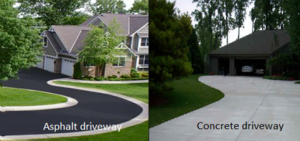 Asphalt and concrete are the two most common driveway materials. These two have been widely used for paving highways or runways and now, even a personal driveway for your home. When choosing pavement to install, it is always a question of “what’s better to use?”. This question can be easily answered by simply analysing the differences between the two, asphalt and concrete. Here are some points to consider when you’re planning to have a new driveway installed.
Asphalt and concrete are the two most common driveway materials. These two have been widely used for paving highways or runways and now, even a personal driveway for your home. When choosing pavement to install, it is always a question of “what’s better to use?”. This question can be easily answered by simply analysing the differences between the two, asphalt and concrete. Here are some points to consider when you’re planning to have a new driveway installed.
Generally, concrete is a mixture of aggregates, cement and water, forming a rock hard surface that can be used in forming pavements and driveways. Asphalt, on the other hand, is a mixture of aggregates and bitumen. The latter is a derivative of crude oil that can bind to aggregate to form a smooth driving surface.
Because the substance used from asphalts is a lot cheaper than cement, asphalt driveways are usually 30% to 45% less expensive than concretes. It is the primary reason why many homeowners prefer asphalt over concrete driveways. The repairs on asphalt driveways cost less, and are easier, when compared to the maintenance cost of damaged concrete.
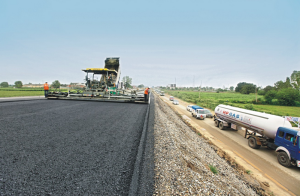 Asphalt projects can be finished faster than those of concretes; thus, asphalts are often used for highway construction. Highways are also constructed of asphalt to accommodate the heavy traffic it undergoes. Unlike concrete, which you have to wait for several days before driving on, asphalt driveways can be used immediately as it cools and dries. A person may also walk on the asphalt pavement on the same day it was installed.
Asphalt projects can be finished faster than those of concretes; thus, asphalts are often used for highway construction. Highways are also constructed of asphalt to accommodate the heavy traffic it undergoes. Unlike concrete, which you have to wait for several days before driving on, asphalt driveways can be used immediately as it cools and dries. A person may also walk on the asphalt pavement on the same day it was installed.
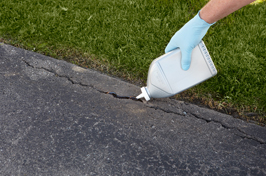 Asphalt cracks can be easily repaired compared to concrete driveways. Sealing and repairing asphalt cracks can be a “do it yourself” task and do not require technician or specialised equipment. You do not have to worry about holes in your asphalt, as it is very easy to fill in with the same material. In such cases that the damage is bigger than holes and cracks, asphalt can simply be re-layered in no time. Damaged concrete driveways, on the other hand, require replacement of the entire driveway, so that the repair marks and patches will not be visible.
Asphalt cracks can be easily repaired compared to concrete driveways. Sealing and repairing asphalt cracks can be a “do it yourself” task and do not require technician or specialised equipment. You do not have to worry about holes in your asphalt, as it is very easy to fill in with the same material. In such cases that the damage is bigger than holes and cracks, asphalt can simply be re-layered in no time. Damaged concrete driveways, on the other hand, require replacement of the entire driveway, so that the repair marks and patches will not be visible.
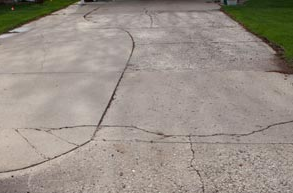 As the weather heats up, asphalt has the capability to expand and shrink when it gets cold. Frequent change in temperature may lead to wear and tear of an asphalt driveway,but because it is made up of oil based substance, it can easily adapt and flex back to its original form. In contrast, concrete does not expand, nor adjust to the temperature. Sometimes, it easily cracks under extreme temperature and pressure. In colder regions, asphalt is more preferable because concretes can be damaged by snow, as well as salts used to prevent ice from crystallizing.
As the weather heats up, asphalt has the capability to expand and shrink when it gets cold. Frequent change in temperature may lead to wear and tear of an asphalt driveway,but because it is made up of oil based substance, it can easily adapt and flex back to its original form. In contrast, concrete does not expand, nor adjust to the temperature. Sometimes, it easily cracks under extreme temperature and pressure. In colder regions, asphalt is more preferable because concretes can be damaged by snow, as well as salts used to prevent ice from crystallizing.
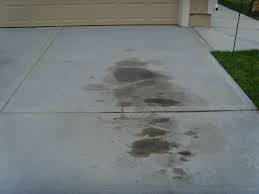 If you’re concerned about the aesthetic look of your driveway, you’ll be pleased to know that oil leaks are far more obvious on concrete driveways. Asphalt has a solid black finish and any oil spill is hardly noticeable. Just be careful not to spill gasoline on your asphalt to prevent damage.
If you’re concerned about the aesthetic look of your driveway, you’ll be pleased to know that oil leaks are far more obvious on concrete driveways. Asphalt has a solid black finish and any oil spill is hardly noticeable. Just be careful not to spill gasoline on your asphalt to prevent damage.
The only advantage of a concrete driveway, over an asphalt drivewayis that it can last 10 years longer, but considering the cost of repair and maintenance (which may be required at shorter intervals), you can still save more money with asphalt. It’s important to add, while the stated age is 20 to 30 years, there are plenty of asphalt driveways that are 50 years old and still look amazing.
Taking into account all the aforementioned differences of asphalt and concrete driveways, it shows that an asphalt driveway is better in the majority of cases. Conclusive enough, but your choice is surely not limited by this literature as you still have to consider your own personal preferences and your budget as well. Whether you choose to install an asphalt driveway or not , the important thing is you have invested some thought into it and weighed the consequences before finally deciding on what’s best for your home.

"The work undertaken by Chris and his team exceeded our expectations. Our driveway has been transformed from a dirty gravel track to a smooth and profe..."
